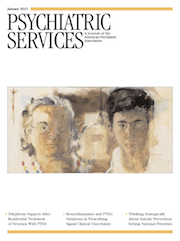Telephone Monitoring and Support After Discharge From Residential PTSD Treatment: A Randomized Controlled Trial
Abstract
Objective
This study assessed whether adding a telephone care management protocol to usual aftercare improved the outcomes of veterans in the year after they were discharged from residential treatment for posttraumatic stress disorder (PTSD).
Methods
In a multisite randomized controlled trial, 837 veterans entering residential PTSD treatment were assigned to receive either standard outpatient aftercare (N=425) or standard aftercare plus biweekly telephone monitoring and support (N=412) for three months after discharge. Symptoms of PTSD and depression, violence, substance use, and quality of life were assessed by self-report questionnaires at intake, discharge, and four and 12 months postdischarge. Treatment utilization was determined from the Department of Veterans Affairs administrative data.
Results
Telephone case monitors reached 355 participants (86%) by phone at least once and provided an average of 4.5 of the six calls planned. Participants in the telephone care and treatment-as-usual groups showed similar outcomes on all clinical measures. Time to rehospitalization did not differ by condition. In contrast with prior studies reporting poor treatment attendance among veterans, participants in both telephone monitoring and treatment as usual completed a mental health visit an average of once every ten days in the year after discharge. Many participants had continuing problems despite high utilization of outpatient care.
Conclusions
Telephone care management had little incremental value for patients who were already high utilizers of mental health services. Telephone care management could potentially be beneficial in settings where patients experience greater barriers to engaging with outpatient mental health care after discharge from inpatient treatment.



